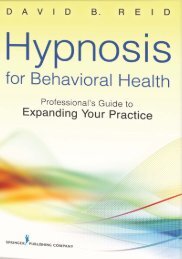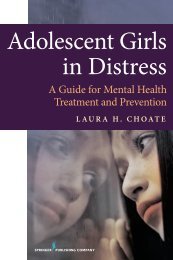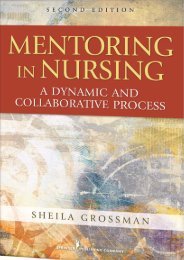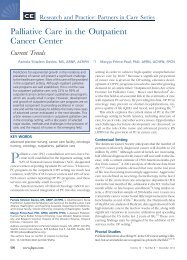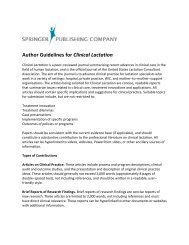social work practice and the law - Springer Publishing
social work practice and the law - Springer Publishing
social work practice and the law - Springer Publishing
You also want an ePaper? Increase the reach of your titles
YUMPU automatically turns print PDFs into web optimized ePapers that Google loves.
1. Identifying <strong>the</strong> Legal Needs <strong>and</strong> Realizing <strong>the</strong> Rights of Social Work Clients 3<br />
duty in seeing that <strong>the</strong> needs <strong>and</strong> rights of <strong>the</strong>ir clients on every level are linked<br />
toge<strong>the</strong>r, met, <strong>and</strong> achieved.<br />
The Legal Services Corporation (LSC) is <strong>the</strong> institution charged by<br />
Congress with <strong>the</strong> administration of a federally funded civil legal assistance<br />
program for those who would o<strong>the</strong>rwise not be able to afford legal counsel.<br />
As part of this responsibility, LSC collects data from states to determine<br />
<strong>the</strong> legal needs of low-income individuals <strong>and</strong> <strong>the</strong> level of legal assistance<br />
available to meet <strong>the</strong> need. LSC has identified <strong>the</strong> difference between<br />
<strong>the</strong> level of legal assistance available <strong>and</strong> <strong>the</strong> level needed to meet <strong>the</strong><br />
needs of low-income Americans as <strong>the</strong> “justice gap” (Legal Services Corporation,<br />
2009).<br />
Findings summarizing data collected from surveys conducted by<br />
different states consistently report that nationwide, low-income individuals<br />
have a significant number of legal needs, from 2 to 5 per year <strong>and</strong> that significant<br />
numbers (80%) of <strong>the</strong>se needs go unaddressed (Committee on Civil<br />
Justice—Supreme Court of Georgia Equal Justice Commission, 2009; District<br />
of Columbia Access to Justice Commission, 2008; Indiana State Bar Association,<br />
2008; Massachusetts Legal Needs Advisory Committee, 2003). State<br />
surveys consistently find less than one in five of <strong>the</strong> legal problems identified<br />
by individuals are actually h<strong>and</strong>led by an attorney (Legal Services Corporation,<br />
2009).<br />
Research also reports that certain groups have more legal concerns than<br />
o<strong>the</strong>r groups, for example: single mo<strong>the</strong>rs, elders, immigrants, those for<br />
whom English is not <strong>the</strong>ir first language, African American <strong>and</strong> Hispanic<br />
households, households comprised of five or more people <strong>and</strong> those with<br />
children (Massachusetts Legal Needs Advisory Committee, 2003).<br />
Civil legal problems cover a range of issues <strong>and</strong> fall into <strong>the</strong> following<br />
categories: family, consumer, housing, employment, education, benefits <strong>and</strong><br />
income, health, <strong>and</strong> immigration needs (Legal Services Corporation, 2009).<br />
Table 1.1 illustrates <strong>the</strong> types of legal problems reported by <strong>the</strong> respondents<br />
from various states in each of <strong>the</strong> categories.<br />
As a <strong>social</strong> <strong>work</strong>er you have probably been educated to identify <strong>and</strong> to<br />
think about many of <strong>the</strong> examples listed in Table 1.1 as <strong>social</strong> service needs.<br />
Regardless of how <strong>the</strong>y are defined, solving <strong>the</strong>se kinds of problems<br />
<strong>and</strong> addressing client needs are essential to fulfilling <strong>social</strong> <strong>work</strong> values <strong>and</strong><br />
ethics such as; <strong>the</strong> <strong>practice</strong> of achieving a good fit between <strong>the</strong> person <strong>and</strong><br />
<strong>the</strong> environment, upholding <strong>and</strong> fostering human rights, <strong>and</strong> <strong>the</strong> achievement<br />
of <strong>social</strong> justice (Witkin, 1998). Legal needs <strong>and</strong> rights can be addressed<br />
in civil courts such as Family Court or in administrative proceedings such<br />
as impartial hearings that assess a claim of unfair denial of government<br />
benefits. In Chapter 4, you will learn much more about <strong>the</strong> way in which<br />
civil <strong>and</strong> administrative proceedings operate. However, it is important for<br />
<strong>social</strong> <strong>work</strong>ers to also know that <strong>the</strong>re is a body of research documenting<br />
that certain groups, such as African American children <strong>and</strong> families, receive<br />
disparate treatment when compared with Whites during all <strong>the</strong> decisionmaking<br />
points that occur in civil proceedings related to child welfare<br />
<strong>and</strong> juvenile justice (Hartley & Silva, 2007; Hill, 2007). This disparity will<br />
be important to be aware of when listening to clients’ concerns about <strong>the</strong>



